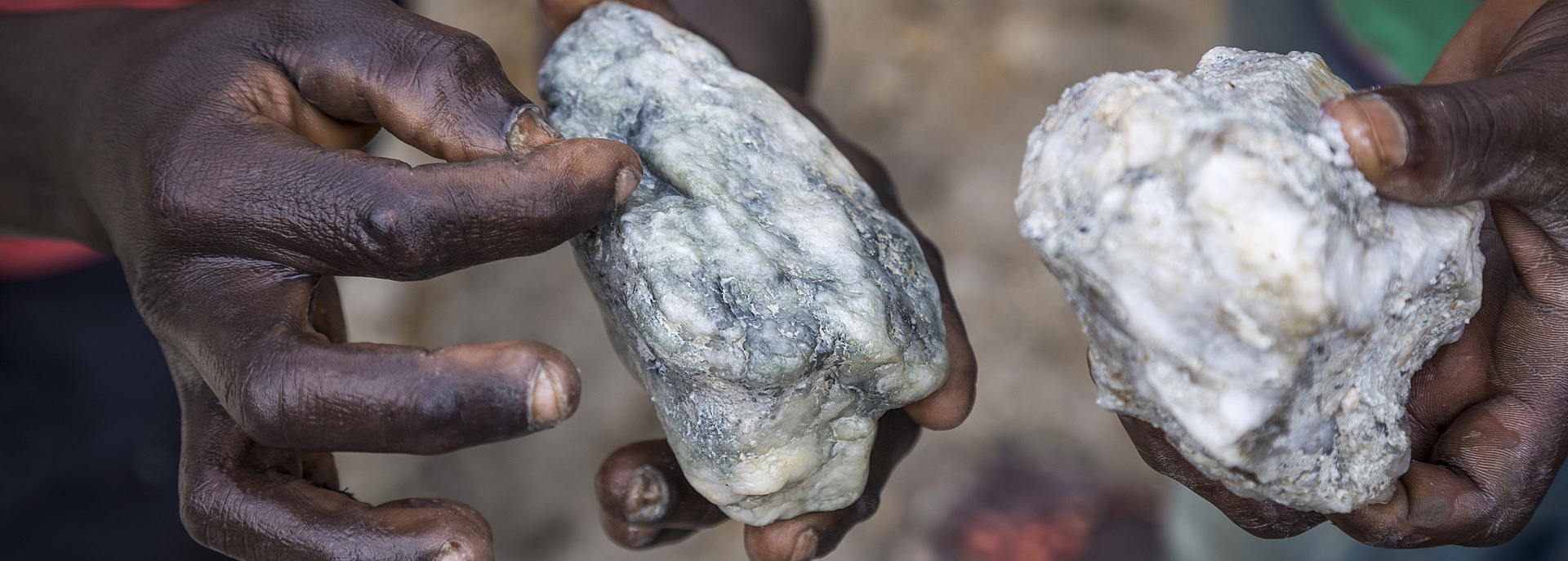
IMPACT on Diamonds
For nearly two decades, IMPACT has worked to end the trade of conflict diamonds. In 2000, we published The Heart of the Matter: Sierra Leone, Diamonds and Human Security—one of the first reports that drew the link between diamonds and conflict financing. Our efforts towards a responsibly-managed diamond supply chain led to a Nobel Peace Prize nomination in 2003.
Diamonds are hard precious gemstones that naturally form over billions of years through high temperatures and pressure, deep below the earth. They are brought to the surface by volcanic eruptions and, over time, are broken down and carried across wide areas by wind and water. Modern technology has made it possible to also grow synthetic diamonds in laboratories that imitate the conditions in which diamonds naturally develop.
The issue of “blood diamonds” first rose to international attention during civil wars in Africa in the 1990s. Rebel groups used the light-weight and high-value gemstones to finance conflicts, leading to drawn-out violence.
In response to international outcry, the Kimberly Process (KP) was established in 2000 and led to the adoption of the KP Certification Scheme that certifies rough diamonds as conflict-free. It was the first multi-stakeholder initiative made up of governments, civil society, and industry collaborating to address a major human rights concern. Countries that are members of the KP have to implement minimum requirements, including proving the origin of rough diamonds.
As the diamond trade continues to change, there are calls for the KP to broaden its definition of conflict diamonds to include violence and human rights abuses committed by governments, private military companies, or other actors—not just rebel groups who aim to finance conflicts to overthrow legitimate governments.
The issues of smuggling, money laundering, and transfer pricing—a practice in which trading centres export diamonds at values higher than they were imported for—are relevant in today’s diamond supply chain and increase risks for miners, their communities, and producing countries. These emerging issues taint the legal supply chain with illicit diamonds and cheat communities out of fair compensation for their natural resources.
Millions of people around the world depend on artisanal diamond mining for their livelihood. In many places it is still informal and unregulated, with miners operating outside of the formal economy. Miners can face human rights abuses at mine sites as well as unsafe conditions worsened by lack of training, safety equipment, and proper tools. Artisanal mining’s informal and unregulated nature can also have devastating environmental impacts, such as deforestation and soil erosion.

We Reveal
We carry out extensive investigations and research into the diamond supply chain, which provides important recommendations that allow us to develop improved systems to end the illicit trade of conflict diamonds. Our research focuses on highlighting ongoing violence and human rights abuses during diamond mining. We also examine the drivers of illicit trade, such as lax controls internally and at trading hubs, and provide recommendations to support the formalization of the artisanal diamond mining sector. We also provide analysis of certification, traceability, and due diligence as it applies to the diamond supply chain.

We Innovate
As part of our efforts to improve management of the diamond supply chain, we were a founding member of the Kimberley Process (KP) in 2000 and helped develop the Kimberley Process Certification Scheme that certifies rough diamonds as conflict-free. In December 2017, we announced our withdrawal from the KP after a failure to make progress on reforms that were needed to bring legitimacy back to the initiative. We continue working with the KP members who genuinely seek to end the trade of conflict and illicit diamonds, through traceability and due diligence, whether through the KP or other initiatives. We continue to collaborate with KP Civil Society Coalition members on the effective implementation of internal controls for diamonds and other conflict-prone minerals, as well as support countries to implement measures to end illicit trade. We have supported the development and implementation of private sector guidelines that promote transparency and due diligence in the diamond sector, including the Organisation for Economic Co-operation and Development’s (OECD) Due Diligence Guidance for Responsible Supply Chains of Minerals from Conflict-Affected and High-Risk Areas. We provide capacity building and sensitization to policymakers, civil society, and the private sector on their responsibilities with regards to the KP and OECD Due Diligence and work with stakeholders to develop strategies to improve controls and end illicit trade.

We Engage
Our work to end the conflict diamond trade requires significant dialogue across stakeholder groups to promote traceability and due diligence and to ensure benefits reach artisanal miners, their communities, and producer countries. We were a founding member—and are a continuing partner—of the KP Civil Society Coalition, a group of non-governmental organizations across Africa, Europe, and North America who bring the voices and concerns of artisanal diamond miners to industry and governments. Together, we engage governments to strengthen their internal controls and encourage the private sector to put in place traceability and due diligence for the entire diamond supply chain. We also drive dialogue with partners including international and national law enforcement agencies, border and customs agencies, policymakers, industry leaders, and financial institutions on the illicit diamond trade. We support regional approaches to end smuggling and the illicit trade of diamonds and we’re part of the technical team advising Côte d’Ivoire, Liberia, Sierra Leone, and Guinea as they develop a joint strategy to strengthen their KP compliance. We also promote sensitization and raise awareness among consumers about the origins of their diamonds.
